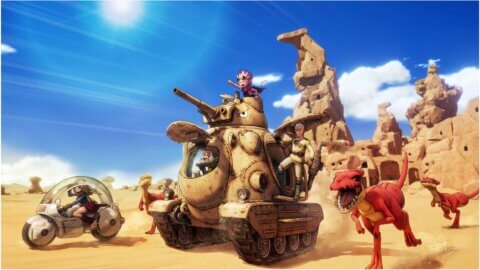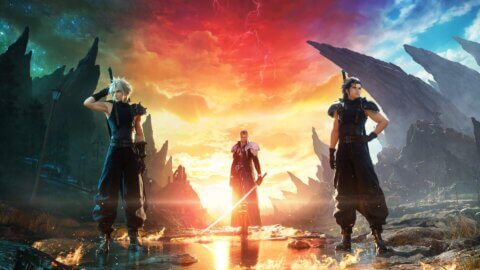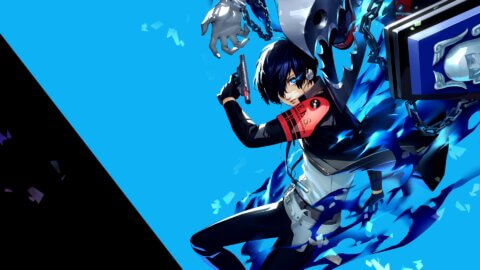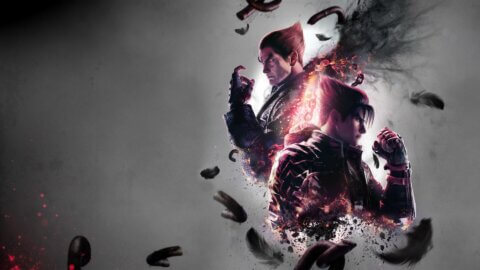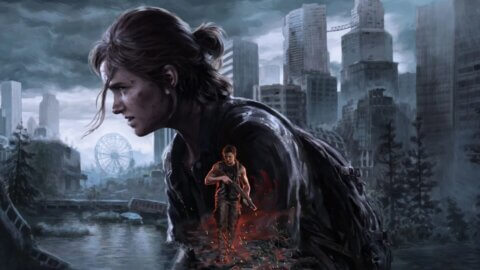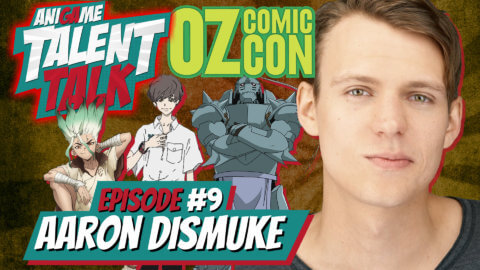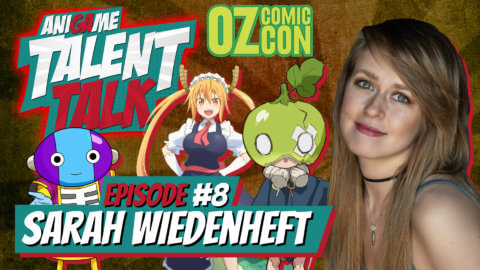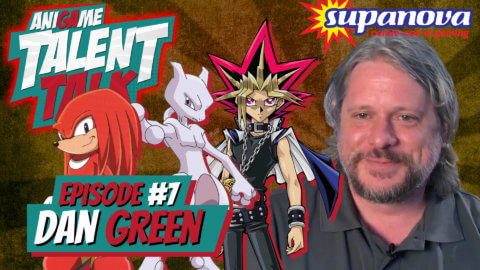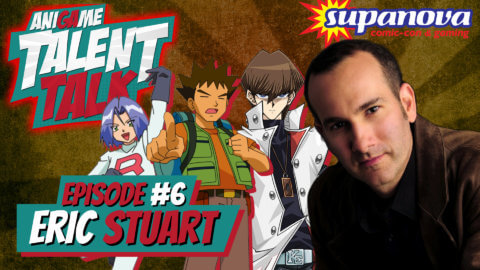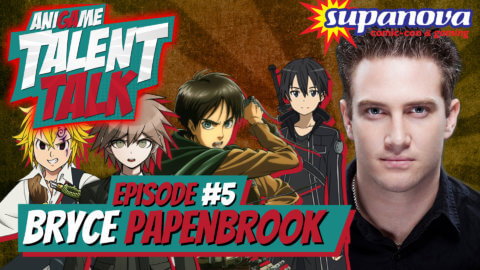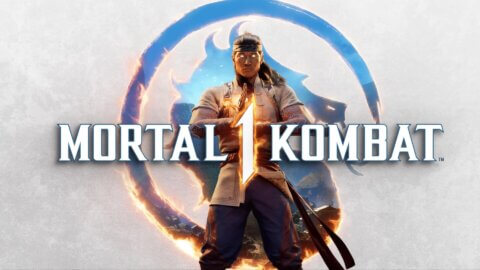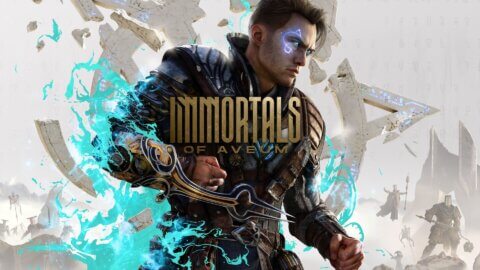In this episode of Talent Talk I sit down and talk with Eric Stuart, known for voicing both Brock and James in Pokemon, Seto Kaiba in Yu-Gi-Oh! and numerous other voices from 4Kids productions.
We discuss how he finds the voices and attitudes for his characters, why anime is localised, what it was like working on phenomenon anime series like Pokemon and Yu-Gi-Oh!, How his music career has helped his voice acting and we also discuss his new project Crossing the G.O.D.S. A series he’s working on with Dan Green and has many voice actors from Pokemon, Yu-Gi-Oh!, Sonic and Ninja Turtles involved.
Throughout the episode we talk about his roles as Seto Kaiba in Yu-Gi-Oh!, Brock and James from Pokemon, and how the Crossing the G.O.D.S project started and what we can expect from it.
This Eric Stuart interview took place live on location at Supanova Sydney 2019.
Audio Version
Joel: So you mentioned yesterday at the panel that Kaiba (Yu-Gi-Oh!) kind of took you a little bit to get the voice right, so he didn’t come off too villainous and didn’t come off too friendly a character. How long did the process take to nail that down? Especially with you being the director of the series as well. Did you kind of just say it’s going to be this? Or did you have someone to kind of bounce ideas off as well?
Eric: So it wasn’t finding the voice. It was finding the attitude. So the voice wasn’t a hard thing to come by, because it’s not that far away from my regular voice. But it’s the attitude that I needed to balance. So I did have a producer that that produced the entire show. Lloyd Goldfine is a brilliant guy. But it was more of as an actor myself to make sure that I didn’t cross that line. Because the script was written a certain way. And you could easily fall into just being a villain. So it didn’t take me a long time. But I couldn’t dial it in, or phone it in as they like to say, I had to basically be focused each session whereas if I have to do Brock or James on Pokemon, I’m on autopilot. I don’t have to think about those characters as much as I do with every nuance of Kaiba.
Joel: Brock is almost in your natural register as well. But yeah, James is way out there. How did you come up with the concept for James (Pokemon)?
Eric: So James, to me is like he’s related to Frasier. Right? Kelsey Grammer. So the brothers would be Frasier, Niles and James. So I went to a very sort of hippy dippy private school, where we all dress like vagabonds. But we played sports against a lot of very uptight, snooty blazers and khaki pants schools. So I just channelled those guys, for James.
Also, as the actor, I wanted to make sure that the two characters who obviously talked to each other a lot were their own, and not, it’s Eric Stuart playing characters. Most of the fans that grew up watching the show had no idea that the same person was both of those characters. I wanted you to listen to Brock and James. Not, “well, Brock kind of sounds like James. So it’s obvious It’s the same guy doing it”. So it’s all about the placement, Brock is in my upper register. I’m totally channelling Casey Kasem, who was my voiceover hero growing up, played Shaggy on Scooby Doo. And of course, my favourite anime of all time ‘Battle of the Planets’, he was Mark on G-Force. So that’s where that voice comes from. And then I wanted to do something in a different placement. So James is a totally rounded sound, lower register. That way they could stay away from each other.
Joel: Obviously, in the business things happen that are out of your control. Was it a little bit sad, saying goodbye to Brock and James? Especially with James still being such a prominent character in Pokemon to this day? Or is it a bit of a relief, you haven’t had to record the 1200+ episodes?
Eric: No, I’m very proud of the work that I did on the show, working on it for 10 years, of course, helping the launch that, you know, property, still being a pop culture phenomenon that if you’re six years old, or 60 years old, you know what Pokemon is right?
It was a great experience. I would love to still do it. But you know, the fact that they moved on and have a new cast. That’s all great. I still get to play Kaiba, which is fun whenever we do that stuff. But, you know, I helped develop those characters. So if anyone’s out there doing their version of it, they’re imitating me. So you know, that’s, that’s fine, too.
Joel: There are still a lot of fans out there that only consider the the Brock/Misty/Ash era of Pokemon to be the only series that matters to them.
Eric: Well, I can’t argue with that.
Joel: But like you said, they are a phenomenon. And you can’t argue that anime is bigger now than it ever has been. But in the early 2000’s, lots of people that were watching it didn’t realise that it was an ‘anime’. And you were involved in quite a lot of those ‘phenomenon series’ like Pokemon and Yu-Gi-Oh! What was it like being a part of those?
Eric: Well, good question. Because here’s the thing, there are those that blame us for changing too many things in the show, which of course came from the network’s. Not from us. The broadcast standards and practices made us change things to be on Saturday morning cartoons. There are strict rules.
Joel: Is that how we ended up with ‘Jelly filled donuts’?
Eric: Right. Well, actually, the jelly filled donut stuff was this. We wanted the show to not come across as Japanese.
Joel: So localise it.
Eric: Right, localise it. If we pick food products that other places could have, rather than just sushi, right? So if it aired in France, if it aired in Australia, wherever, you could relate to the food product as your own.
The localisation was huge. And making it approachable to all the kids that are watching it. They felt like it was their country’s show now. Any country that speaks English, of course, grew up watching our dub. You know, so we weren’t doing it with the Australian accent. But the French version, the German version, that’s other actors, but using our dialogue or our script, because it was more universal. We adapt that script, and we change things that don’t make sense, globally, right. But the other thing is a show like Pokemon took anime from the back area of a video store.
Joel: Yeah it really did.
Eric: And now that’s why there are conventions like this. That’s why there are fans that love all of this stuff. Because it has become, thanks to shows like Pokemon, universal. So you might be blame us for watering down the original. But then we also helped create this fandom.
Joel: It was kind of a gateway to opening people up to more anime.
Eric: Yeah, and you can go back and watch original things. I mean, The Dark Side of Dimensions, the Yu-Gi-Oh! movie, we stuck to the original storyline very closely, which worked.
Joel: I really appreciated that because a lot of the fans that would have been fans of the original series are 15 years older now as well. So that darker storyline and themes suited them.
Eric: And it worked. You know, a lot of times production companies don’t trust the fans will understand, right? With that movie, we made sure that we said ‘you’re older now. We can tell the story the way it’s supposed to be told or more closer to the original’. With a couple of little jokes in there and things that would make it you know, relateble.
Joel: Yeah and fans like me, really appreciate that.
But getting on to thing else. You’re also well into your music. And you were performing your music before you were a voice actor. A lot of the arts go hand in hand. Is there anything from the music side of things that has helped you as a voice actor, whether it be like breathing etc?
Eric: Right, good question. So inflection is pitch. So being a singer, and being musical is very helpful, in how to read. If an actor is doing a line and someone says, ‘Can you go for that word’, or ‘can you stress that word’, you’re changing the pitch? And so it’s very helpful. Also, with a lot of the dubbing, I watch the pacing of lip flaps. What I say to fans is ‘okay, imagine you hear a song for the first time on the radio. By the second chorus, you should be able to sing along with it if the words are the same, because you’ve heard the first chorus. You’ve you’ve memorised the timing of it. You might not sing the notes great, but you got the phrasing’. It’s the same thing with lip flap. The musicality of it. The rhythm of it. I can watch lip flap one time. If the line is written correctly, I will get it to fit because I’ve memorised the timing. So this the the music side of my life has helped me that way. You know, and I do more speaking like me in voiceovers than I do in funny voices. So timing, pace, things like that, it’s very close to my singing voice.
Joel: Also, another side project that you seem to be involved in and one of the most interesting things I saw yesterday is Crossing the G.O.D.S. Working with Dan Green, as well as some of the other people from the original Pokemon series and things like that. Can you talk a little bit about how that project came to be?
Eric: Yes, I can. So Crossing the G.O.D.S, we call it an illustrated audio drama. So if you imagine an audio book, where you’re following it by reading a comic book alongside it. The artwork is all black and white. There’s no lip flap. It’s not animation. It’s like a what we call an animatic. So it’s a shifting of camera moves, facial shifts, but no articulation with the arms. It’s not like people are swinging weapons.
Joel: I thought of it as like a really high fidelity storyboard.
Eric: Yes, exactly. Because what we wanted to do was not compete with that genre. That’s not what we do. But we’re all comic book nerds. And we’re voice actors. So it stars a lot of the people from Pokemon, and Yu-Gi-Oh and Turtles and all of that. But in the 30 years of being in this business, we have learned a lot about storytelling, what not to do and what to do. And we thought, we should do something on our own, it would be neat to create. Dan and I were sitting together at a convention. And I finally said, ‘Hey, I’m sure you’ve got an idea, we should just do it’. And he had some ideas, he’d be kicking around and said, ‘let’s do something, let’s set up a weekly conference call. And let’s just do it’. So every Tuesday morning, we get online together, and we talk about the project. He wrote the script, we did 26 episodes of recording already, and he’s hand drawing it. And it’s really cool. I mean, to me, it’s like the format of all of the old serial shows.
So it’s five to seven minute episodes, just enough to make you want to watch the next one. And hopefully the fans enjoy the fact that we’re not holding their hand through it.
Joel: I really liked that.
Eric: And what we don’t really go into, we didn’t talk about it as much in our in our presentation. But the characters themselves are presented with we call tortures. The villain stirs up their baggage, their issues. And throughout the show, it doesn’t define them, but they have to deal with their own issues before they can help others. And so there’s a human side of this, because the things that they’re going through, we think people will be able to relate to, there’s something for everyone that way.
And it also shows people that if you are going through something that’s tough, you’re not the only one. Without being preachy about it, we thought it was a good underlying message to the show mixed in with sci-fi and superheroes.
Joel: Just based off that first episode I got a kind of grounded X-Men feeling. Is that what you were going for?
Eric: Right! It is, it is. There’s definitely that. A lot of the characters though, they don’t have special powers. Because we believe that everyone can be a hero. If you help one person, you’re a hero. Right? So there’s really very few ‘special’ like, you know, maybe a couple of cool things like that. But it’s really more about their soul, their moral.
Joel: So you kind of touched on it earlier. But with your dubbing side of things, you’re kind of the end process. It’s been localised, written, translated and then you do the voices last. This is kind of going to the start of the circle where you guys get to create.
Eric: Exactly. It’s fun to do that. And what I really enjoy about this project is, I do get to play a character and it which is fun. But I build the show, all of the voices are recorded individually. I assemble the dialogue, I’m mixing the music and the sound effects in there. So while Dan is drawing, I’m doing all the audio production. And that’s fun to do. It’s fun to sort of be behind the scenes.
Joel: So working on a prelay rather than a dub.
Eric: That’s exactly what it is. That’s right, because I also directed Viva Piñata, which was a prelay show.
Joel: How many God cards can we expect to see in Crossing the G.O.D.S haha?
Eric: You know, that’s a good question. I’ll have to ask Dan about that.
Joel: So before we wrap up, where can fans on follow you online or follow your work?
Eric: So for me personally, Ericstuart.com, you can follow my music career, where I’m appearing with conventions, all sorts of stuff like that. I try to answer as much fan mail as possible. With Crossing the G.O.D.S we got a Facebook page, it’s Crossing the G.O.D.S, like our page, and you can follow what we’re doing with the show. We like fan feedback as well. We’d love to be able to tell people when the show is finally out there. And the only way that they can keep up with us is to like the page.
Joel: So we saw the first episode here yesterday at Supanova, is there any time that will become public?
Eric: Yeah, we want to finish three episodes, which we’ve already recorded, but Dan is drawing them. And then we’re going to do some presentations to some of the industry folks that we know, to get some feedback from them before we continue. Because there are some people that we really respect their opinions. And we want to get that before we dive into much further.
Joel: Awesome! Thanks for your time Eric.
Eric: Yeah. Good questions. I Appreciate it.
If you want to see more content like this and never miss one of our frequent gaming and anime giveaways come and Follow Ani-Game on Twitter.
